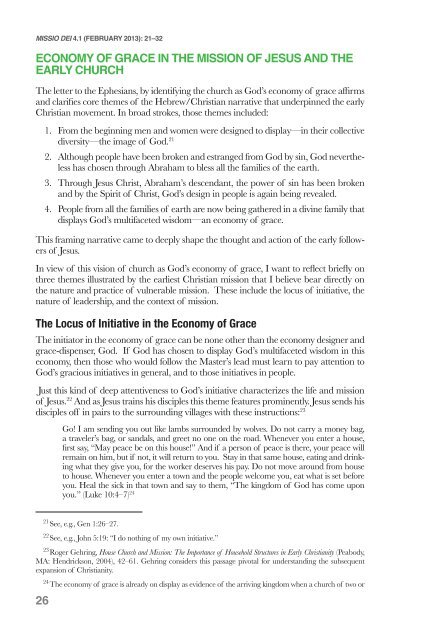VULNERABLE MISSION
VULNERABLE MISSION
VULNERABLE MISSION
You also want an ePaper? Increase the reach of your titles
YUMPU automatically turns print PDFs into web optimized ePapers that Google loves.
MISSIO DEI 4.1 (FEBRUARY 2013): 21–32<br />
ECONOMY OF GRACE IN THE <strong>MISSION</strong> OF JESUS AND THE<br />
EARLY CHURCH<br />
The letter to the Ephesians, by identifying the church as God’s economy of grace affirms<br />
and clarifies core themes of the Hebrew/Christian narrative that underpinned the early<br />
Christian movement. In broad strokes, those themes included:<br />
26<br />
1. From the beginning men and women were designed to display—in their collective<br />
diversity—the image of God. 21<br />
2. Although people have been broken and estranged from God by sin, God nevertheless<br />
has chosen through Abraham to bless all the families of the earth.<br />
3. Through Jesus Christ, Abraham’s descendant, the power of sin has been broken<br />
and by the Spirit of Christ, God’s design in people is again being revealed.<br />
4. People from all the families of earth are now being gathered in a divine family that<br />
displays God’s multifaceted wisdom—an economy of grace.<br />
This framing narrative came to deeply shape the thought and action of the early followers<br />
of Jesus.<br />
In view of this vision of church as God’s economy of grace, I want to reflect briefly on<br />
three themes illustrated by the earliest Christian mission that I believe bear directly on<br />
the nature and practice of vulnerable mission. These include the locus of initiative, the<br />
nature of leadership, and the context of mission.<br />
The Locus of Initiative in the Economy of Grace<br />
The initiator in the economy of grace can be none other than the economy designer and<br />
grace-dispenser, God. If God has chosen to display God’s multifaceted wisdom in this<br />
economy, then those who would follow the Master’s lead must learn to pay attention to<br />
God’s gracious initiatives in general, and to those initiatives in people.<br />
Just this kind of deep attentiveness to God’s initiative characterizes the life and mission<br />
of Jesus. 22 And as Jesus trains his disciples this theme features prominently. Jesus sends his<br />
disciples off in pairs to the surrounding villages with these instructions: 23<br />
Go! I am sending you out like lambs surrounded by wolves. Do not carry a money bag,<br />
a traveler’s bag, or sandals, and greet no one on the road. Whenever you enter a house,<br />
first say, “May peace be on this house!” And if a person of peace is there, your peace will<br />
remain on him, but if not, it will return to you. Stay in that same house, eating and drinking<br />
what they give you, for the worker deserves his pay. Do not move around from house<br />
to house. Whenever you enter a town and the people welcome you, eat what is set before<br />
you. Heal the sick in that town and say to them, “The kingdom of God has come upon<br />
you.” (Luke 10:4–7) 24<br />
21 See, e.g., Gen 1:26–27.<br />
22 See, e.g., John 5:19: “I do nothing of my own initiative.”<br />
23 Roger Gehring, House Church and Mission: The Importance of Household Structures in Early Christianity (Peabody,<br />
MA: Hendrickson, 2004), 42–61. Gehring considers this passage pivotal for understanding the subsequent<br />
expansion of Christianity.<br />
24 The economy of grace is already on display as evidence of the arriving kingdom when a church of two or


